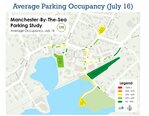




Right about now, there’s a distinct year-end quality to municipal boards. They’re closing things out and getting things ready for next year. That was certainly true Monday, when the Manchester Planning Board moved on potential articles for next year’s Annual Town Meeting, approved two marina expansion special permits, and previewed a significant downtown parking study.
First up, Crocker’s Boat Yard and Manchester Marine each secured approvals by a 5-0 vote to significantly expand their slip and dock space.
As part of the process, the marinas shared their plans with the Conservation Commission, the Select Board, Harbormaster Bion Pike and the Harbor Advisory Committee (HAC).
Pike and the HAC have endorsed the expansion plans. Both were key to the Planning Board’s approval.
Crocker’s expansion is for added boat slip rentals. Manchester Marine’s expansion is for needed operational space.
As part of the “public benefit” concessions tied to the permits, Crocker’s will continue to offer commercial lobstermen use of its docks during the off season and will clear ice in the inner harbor at Morss Pier when needed. The marinas also agreed to create public safety signage for paddleboarders and kayakers.
Special permit approvals require a “supermajority” of the board, so Chair Ron Mastrogiacomo took a straw poll before the vote. All indicated a “yes” except PB member Christina Delisio, who said she would not support “any new marine expansion project” without a completed Harbor Master Plan.
But the idea of a Harbor Master Plan is relatively new, initiated this past summer by a neighborhood group at Norton’s Point that presented to the Select Board two months ago. This fall, the SB said it’s inclined to pursue a comprehensive Harbor Master Plan, which is expected to take up to two years and an estimated $125,000 to complete.
Delisio said the idea of developing and funding a Harbor Master Plan could be brought to voters for approval as early as April’s Town Meeting, and it could be funded directly by taxpayers without seeking grant money.
Responding to Delisio, Select Board Chair Becky Jaques said even if Manchester wants to pursue development of a Harbor Master Plan, expecting approval for the incremental project at ATM is “premature.”
Harbormaster Pike agreed. He said the marina projects have value now. The plans feature mooring tie-ups that prevent dangerous “swinging” of boats with tides and winds. Pike also said the expansion would take each marina’s floats to the edge of the federally managed channel, so no further expansion would be possible, even if the marinas wanted it.
Skip Crocker told the board his family-owned marina has taken a lot of time and resources with the current, and he won’t be seeking anything else.
Delisio softened her stance and voted with the others.
For the last 18 months, the Manchester Downtown Improvement Committee (DIP) has focused on how to impact some of downtown Manchester’s most vexing challenges, including public bathrooms, improving dialog with downtown retailers, enhancing walkways and design, and addressing the perennial complaint of downtown parking.
On Monday, the Planning Board got a preview of a grant-funded parking study from Adi Nochur, a transportation studies consultant with the regional planning agency, Metropolitan Area Planning Council (MAPC). The idea was to share initial findings with the Planning Board and secure feedback in anticipation of the final MAPC report that will be delivered in March.
The goals of the parking study are to understand downtown parking capacity and behavior, provide policy and land use recommendations to optimize parking supply more effectively. The final report will also inform the town on ways to implement new zoning to comply with the mandated MBTA Communities Multifamily Zoning (40A), if Manchester decides to opt into the requirements in 2024.
The field study collected parking data (parking duration, turnover, partial license plate collection) for two full days, one in May 2022 and another in July, and monitored 484 parking spots, on-street and three municipal lots and 124 spots at the Singing Beach parking lot.
Initial findings show that parking occupancy across the board is consistently below the state’s 85 percent benchmark. In other words, an adequate parking supply.
Nochur said location-specific variations in occupancy create potential for targeted parking management strategies. While some people park on-street for extended durations, most people parking adhere to posted time limits. Off-street parking lots contain a broad and complicated variety of parking regulations.
“In general 85 percent is acceptable for parking downtown,” said the PB’s Chris Olney, noting that while there may be a perception gap about parking the challenge remains that downtown residents in apartments who have to use whatever spaces they can find.
DIP Chairman Steve Carhart was in attendance on Monday with members Linda Crosby and Marlene Dolan who oversaw work on parking, including a survey deployed earlier this year to 119 businesses and organizations that had a 31 percent response rate.
Dolan said the survey confirmed that businesses want parking that is close to their front door, which may not be realistic or optimal. She also said the DIP’s own studies show that the parking lot behind Town Hall is often filled with residents.
“We have a cacophony of (parking) problems,” observed Dolan, adding that parking options for visitors suffer from residents currently using the town lot and street parking often being taken by employees of downtown businesses.
At last month’s Special Town Meeting (STM), five of the 12 Planning Board’s articles for recodification were passed and after a chaotic night of confusion and technical challenges with the electronic voting system, the board moved to pass over its remaining articles. After STM, the Planning Board resolved to parse out the remaining articles into easier-to-digest chunks.
On Monday, PB member Sarah Creighton signaled how that would happen. Creighton and Olney are heading up the effort to steer the board to the April 3 Annual Town Meeting (ATM) and will offer their fellow board members options in January on which articles to bring forward and the work plan to make sure it’s done right.
With the ATM on April 3, she said, the Warrant would have to be finalized at the March 6 meeting of the Select Board. Because of this, the Planning Board would have to hold a public hearing on potential articles on or near February 6. Then, the final article candidates to present to voters is February 13.
Candidate articles floated so far seem to signal a relatively low bar for passage. Two articles are administrative. One addressing adult entertainment in the Limited Commercial District is a low-resistance issue. The board’s inclination seems to be avoiding articles that will trigger long debates at ATM, where there will be a lot of other competing issues of municipal business.
The next meeting of the Planning Board is Monday, January 9.